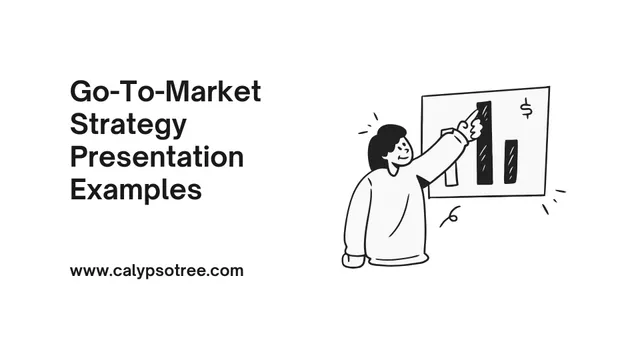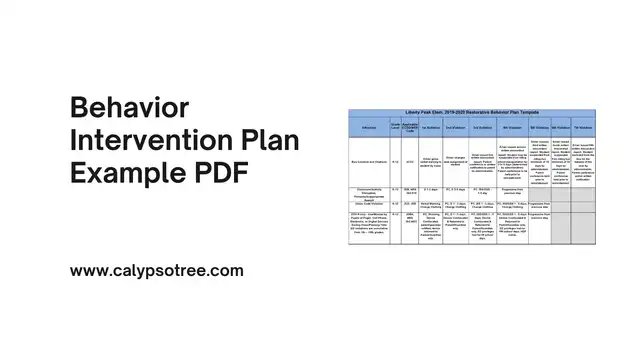A school principal is the leader of a school. They make sure everything runs smoothly. They are very important in education. Knowing the job description for a school principal helps us understand how important they are in making schools work well.
Job Description for a School Principal (Main Duties)
Here is some job description for a school principal or primary duties:
Leadership and Management
A principal leads the school community. They make big decisions for the school. They also manage school operations. This means they make sure everything is working as it should.
Curriculum Development
A principal oversees curriculum planning. They ensure that what students learn is up to standard and help teachers plan lessons that meet educational standards.
Student Discipline
Principals handle student discipline. They make rules to keep students safe and focused and deal with problems like bad behaviour.
Staff Support and Supervision
Principals support teachers and staff. They conduct evaluations to help teachers improve. They also organize professional development for staff.
Parent and Community Engagement
Principals build relationships with parents, talk to them about their children’s progress, and engage with the community. This helps the school gain support from outside sources.
Educational Requirements
To become a school principal, you need specific degrees and certifications. Here’s what you typically need:
- Education Degree: Most principals have a degree in education. This means they went to college to learn about teaching and how schools work.
- Master’s Degree: Some principals also have a master’s degree. This is extra education after college that helps them learn even more about running a school.
- Certifications: Principals need certifications. These are special papers that show they passed important tests. Certifications can be about teaching, leading schools, or managing people.
Experience Requirements
Principals need a lot of experience working in schools. Here’s what their experience usually includes:
- Teaching: Most principals start as teachers. They spend many years teaching students. This helps them understand what teachers need and how students learn best.
- Administrative Roles: After teaching, they often get jobs as assistant principals or other leaders in schools. This gives them experience in school administration, which means running the school and making sure everything works well.
- Leadership: Principals also need leadership experience. This means they have shown they can lead and make good decisions for the school.
Skills Needed to Be a Successful School Principal
Principals need many skills to do their job well. Here are some key skills:
Communication Skills
Communication is crucial for principals. Here’s why:
- Talking and Listening: Principals need to talk clearly and listen carefully. They talk to teachers, students, parents, and the community every day. Good communication helps everyone understand what is happening and what they need to do.
- Writing: Principals also need to write well. They write emails, newsletters, and reports. Clear writing helps share important information effectively.
Organization Skills
Principals need to be very organized. Here’s how it helps:
- Planning: Principals plan the school year, schedule meetings, and organize events. Being organized helps them keep track of everything.
- Managing Tasks: Principals have many tasks to manage. They need to know what needs to be done and who is responsible. This helps the school run smoothly.
Problem-Solving Skills
Principals solve many problems. Here’s how:
- Quick Decisions: Principals make quick and good decisions. This helps them solve issues efficiently.
- Finding Solutions: Principals find fair solutions to problems. They listen to everyone’s concerns and find the best way to solve them.
Educational Leadership Skills
Being a leader is a big part of a principal’s job. Here’s what it involves:
- Inspiring Others: Principals inspire teachers, staff, and students. They set a good example and motivate everyone to do their best.
- Making Decisions: Principals make important decisions for the school. They think about what is best for the students and staff and make choices that help the school succeed.
- Other Skills: Being patient, understanding, and able to work well with different types of people are also important skills for principals.
What Is the Typical Work Schedule of a School Principal?
Daily and Weekly Work Hours
The principal work schedule is very busy. Here’s what it usually looks like:
- Regular Hours: Principals work every day that school is in session. They usually start early in the morning before students arrive and stay until the late afternoon after students leave. This is often from about 7:30 AM to 4:30 PM.
- Extra Responsibilities: Principals also have extra principal responsibilities that can extend their work hours. They may need to attend school events like plays, sports games, and parent-teacher meetings. These events can happen in the evenings or on weekends.
Extra Responsibilities and Events
Principals often have to handle many extra tasks. Here are some examples:
- School Events: Principals attend school events such as plays, sports games, and concerts. These events can be in the evenings or on weekends.
- Meetings: Principals have many meetings. They meet with teachers, staff, parents, and sometimes students.
- Emergencies: Principals need to be ready for emergencies. If something urgent happens at the school, they may need to come in early, stay late, or even come in on weekends.
Work Environment
The work environment of a school principal is varied. Here’s where they spend their time:
- Office: Principals have an office where they do a lot of their planning and paperwork.
- Classrooms: Principals visit classrooms to see how teachers are teaching and how students are learning.
- Hallways and Common Areas: Principals walk around the school to make sure everything is safe and running smoothly.
Interaction with Students, Staff, and Parents
Principals interact with many people every day. Here’s how they spend their time:
- Students: Principals talk to students to learn about their needs and help solve their problems.
- Staff: Principals meet with teachers and other staff members to give teacher support and advice.
- Parents: Principals talk to parents about their children’s progress and any concerns they might have.
Ensuring a Safe and Conducive Learning Environment
Safety Policies
School principals make sure schools are safe. Here’s how they do it:
- Implementing Safety Measures: Principals put safety rules in place. These rules help keep students and staff safe. For example, they might have rules about how to behave in hallways or during emergencies.
- Regular Drills: Principals organize regular safety drills. These drills practice what to do in case of a fire, earthquake, or lockdown. Practicing helps everyone stay calm and know what to do if something happens.
- Security Systems: Many schools have security systems. These can include cameras, alarms, and locked doors. Principals make sure these systems are working properly.
- Training: Principals make sure teachers and staff are trained in safety procedures. This includes first aid, CPR, and how to handle emergencies.
Handling Emergencies
Principals need to be ready for emergencies. Here’s what they do:
- Emergency Plans: Principals create emergency plans. These plans outline what to do in different types of emergencies. Everyone in the school learns these plans.
- Communication: During an emergency, communication is key. Principals make sure they can quickly contact teachers, staff, and parents.
- Quick Response: Principals need to respond quickly in emergencies. They stay calm and make decisions to keep everyone safe. This might mean calling for help or guiding students and staff to safety.
Promoting a Positive School Culture
A positive school culture helps students learn and feel good about school. Here’s how principals promote it:
- Encouraging Positive Behavior: Principals encourage students to behave well. They set clear rules and expectations. They also reward good behavior with praise or special activities.
- Fostering an Inclusive Environment: Principals make sure everyone feels welcome at school. They celebrate different cultures and backgrounds. This helps students feel included and respected.
- Conflict Resolution: When problems arise, principals help solve them. They talk to students about their issues and find fair solutions. This helps keep the school peaceful and friendly.
Building Relationships
Building good relationships is important for a positive learning environment. Here’s how principals do it:
- With Students: Principals get to know students. They talk to them and listen to their concerns. This helps students feel valued and understood.
- With Teachers and Staff: Principals support their teachers and staff. They provide resources and training to help them do their jobs well. A happy and supported staff creates a better learning environment.
- With Parents: Principals build strong relationships with parents. They communicate regularly about students’ progress and school events. Engaged parents can support their children’s learning at home.
How Does a School Principal Interact with Parents and the Community?
Building Relationships
Principals build strong relationships with parents and the community. Here’s how they do it:
- Regular Communication: Principals keep parents informed. They send newsletters, emails, and make phone calls. This helps parents know what is happening at school.
- Meetings and Events: Principals organize meetings and events for parents.
- Open Door Policy: Many principals have an open-door policy. This means parents can come and talk to them anytime. It helps parents feel welcome and heard.
Engaging the Community
Principals also work with the community. Here’s how:
- Community Programs: Principals organize programs that involve the community. This might include volunteer opportunities, school fairs, and fundraisers.
- Partnerships: Principals create partnerships with local businesses and organizations. These partnerships can provide resources and support for the school. For example, a local business might sponsor a school event or donate supplies.
How Do School Principals Support Teachers and Staff?
Providing Resources
Principals make sure teachers and staff have what they need. Here’s what they do:
- Teaching Materials: Principals provide books, technology, and other materials. These tools help teachers teach effectively.
- Professional Development: Principals organize training sessions. These sessions help teachers learn new skills and stay updated on the latest teaching methods.
Offering Guidance
Principals guide and support their teachers and staff. Here’s how:
- Regular Meetings: Principals meet with teachers regularly. These meetings help teachers discuss their needs and get advice.
- Mentorship: Principals often act as mentors. They give feedback and help teachers improve their teaching. This support helps teachers feel confident and capable.
Creating a Positive Work Environment
Principals create a happy and productive work environment. Here’s what they do:
- Recognition: Principals recognize and celebrate the hard work of their teachers and staff. They give awards, shout-outs, and organize appreciation events. This makes teachers feel valued and motivated.
- Team Building: Principals encourage teamwork. A strong team works better together and creates a positive school environment.
What Is the Role in Curriculum Development?
Overseeing Curriculum Planning
School principals play a big part in creating the curriculum standards. Here’s what they do:
- Planning: Principals help plan what students will learn. They work with teachers to make sure lessons are well-organized and cover important topics.
- Choosing Materials: Principals help pick the books, technology, and other materials that students will use. They make sure these materials are up-to-date and useful for learning.
Ensuring Curriculum Meets Educational Standards
Principals make sure the curriculum meets standards. Here’s how:
- Following Guidelines: Principals follow local and national education guidelines. These guidelines say what students need to learn at each grade level.
- Reviewing and Updating: Principals review the curriculum regularly. They update it to keep up with new information and teaching methods. This helps students get the best education possible.
Supporting Teachers in Curriculum Delivery
Principals support teachers with the curriculum. Here’s how:
- Training: Principals organize training for teachers. This helps teachers understand the curriculum and how to teach it well.
- Resources: Principals provide the resources teachers need. This can include lesson plans, teaching tools, and extra materials to help with lessons.
How Does a School Principal Handle Student Discipline?
Implementing Discipline Policies
Principals make and enforce discipline policies. Here’s what they do:
- Setting Rules: Principals set clear rules for behavior. These rules help students know what is expected of them.
- Communicating Policies: Principals make sure everyone knows the discipline policies. They talk to students, teachers, and parents about the rules and consequences.
Handling Disciplinary Actions
When students break the rules, principals take action. Here’s how:
- Listening to Students: Principals listen to students’ side of the story. They want to understand what happened before making a decision.
- Giving Consequences: Principals give fair consequences for bad behavior. This can include things like detention, suspension, or extra assignments. They make sure the punishment fits the rule that was broken.
Promoting Positive Behavior
Principals encourage good behavior. Here’s how:
- Rewarding Good Behavior: Principals reward students who follow the rules and do well in school. This can be with praise, certificates, or special privileges.
- Teaching Expectations: Principals teach students what good behavior looks like. They give examples and explain why it is important. This helps students understand and follow the rules better.
Working with Parents and Staff
Principals work with parents and staff on discipline. Here’s how:
- Talking to Parents: Principals talk to parents about their student’s behavior. They work together to find solutions and support the student.
- Supporting Teachers: Principals help teachers manage their classrooms. They give advice and support when teachers face discipline issues.
The Benefits of Being a School Principal
Being a school principal has many benefits. Here are some of the key advantages:
Leadership Opportunities
As a principal, you lead the school. You make important decisions that help students and teachers.
Making a Difference
Principals have a big impact on students’ lives. Knowing you are making a difference can feel great.
Professional Growth
Being a principal helps you grow professionally. You learn new skills, attend training, and stay updated on the latest education trends.
Job Stability
Principals often have stable jobs. Schools always need good leaders, so there is a steady demand for experienced principals.
Good Salary
Principals usually earn a good salary. The salary reflects the hard work and responsibilities of the job.
Benefits
Being a principal often includes benefits like health insurance, retirement plans, and paid time off.
Building Relationships
Principals build strong relationships with students, teachers, and parents.
Personal Satisfaction
Being a principal can bring personal satisfaction. Helping students learn and grow is very gratifying.
Opportunities for Creativity
Principals have the chance to be creative. You can develop new programs, solve problems uniquely, and create a positive school culture.
Respect and Recognition
Principals are respected members of the community. This respect and recognition are very rewarding.
Sample Job Description for a School Principal
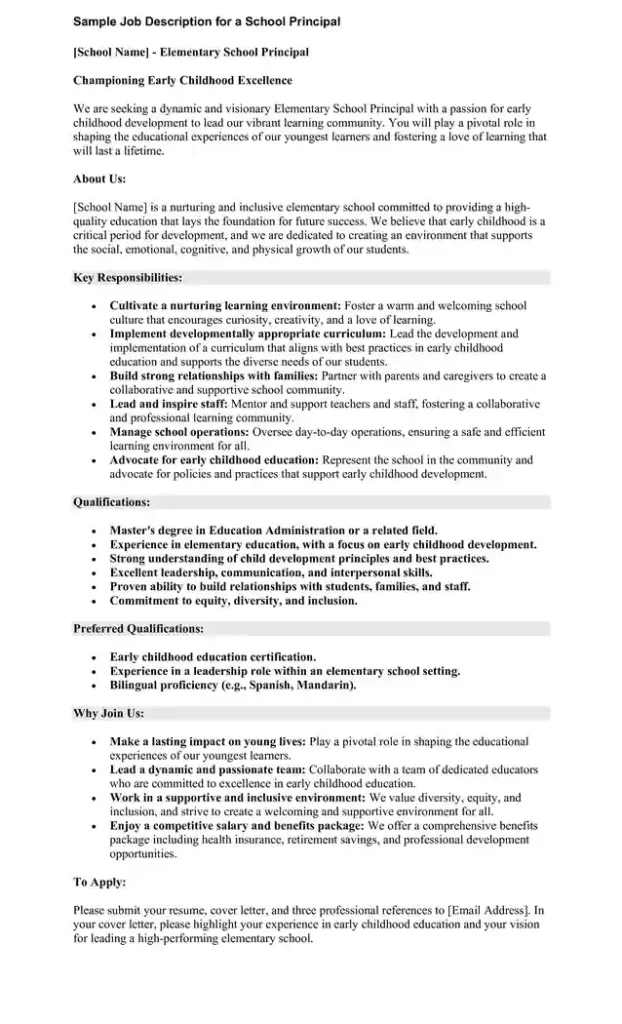
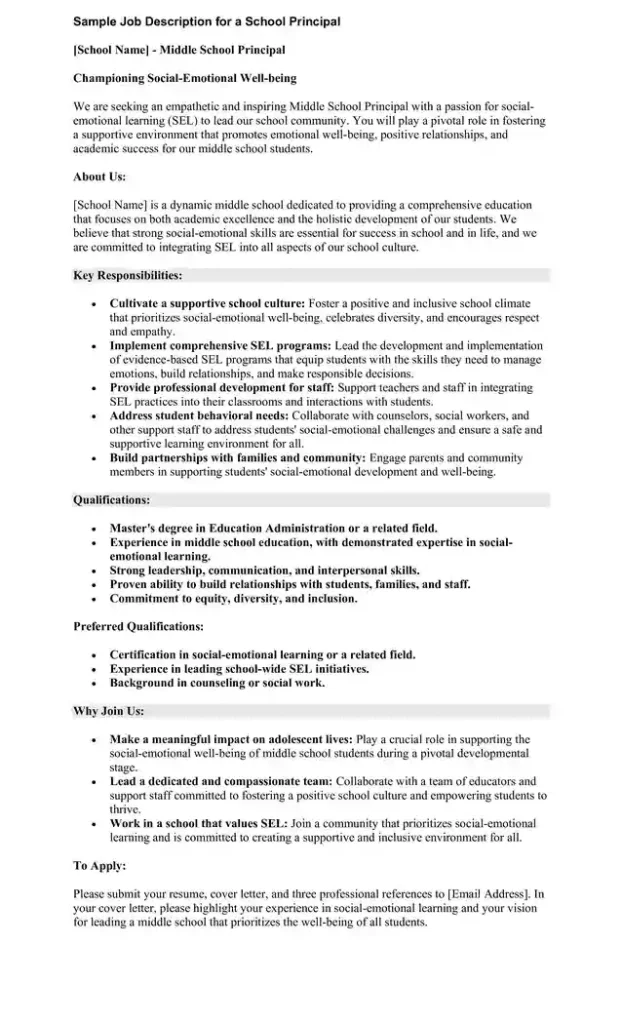
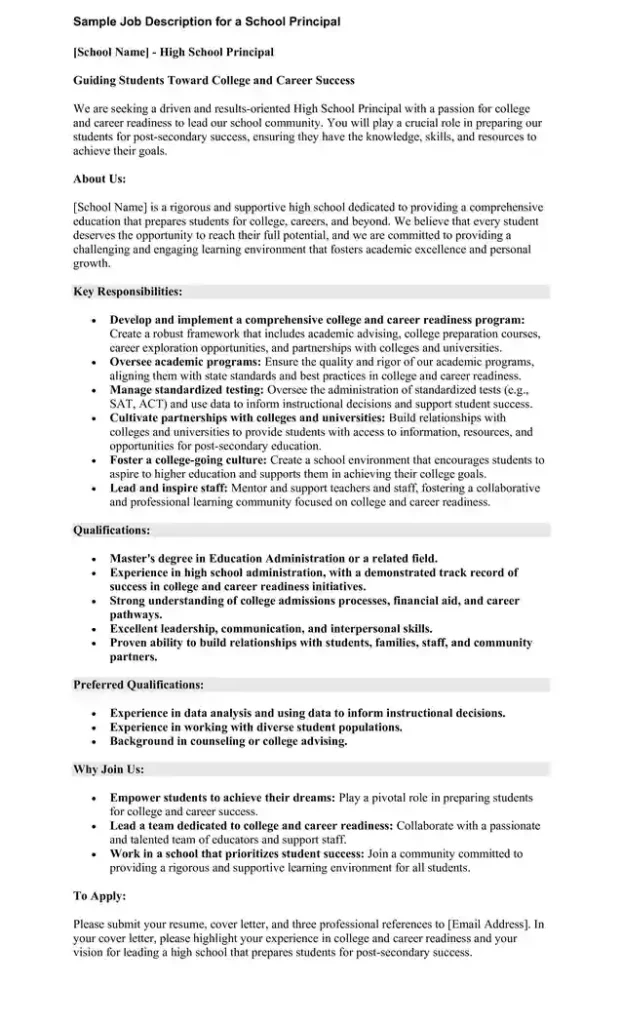
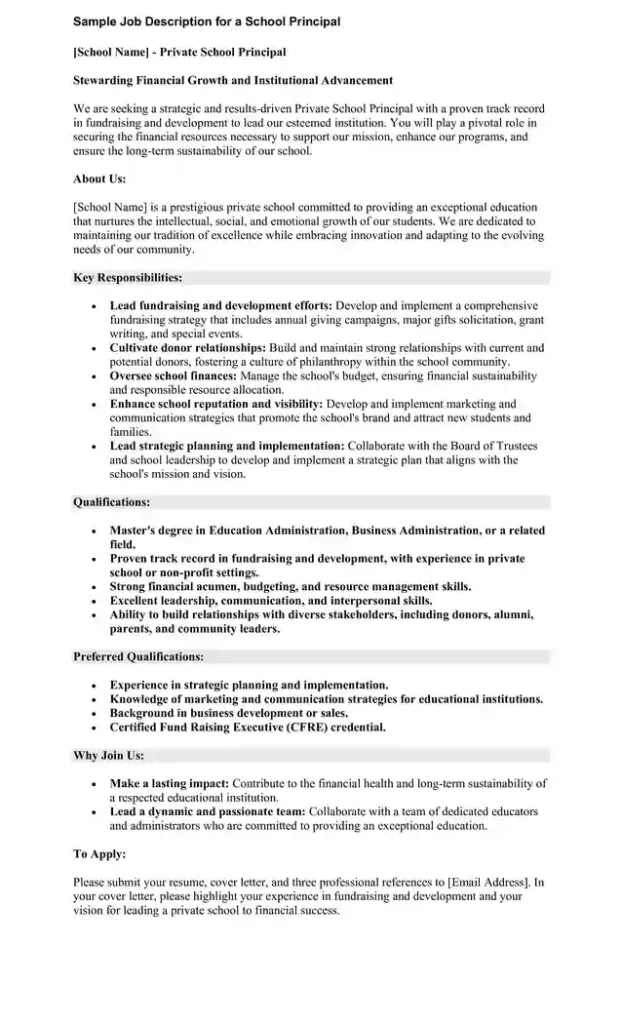
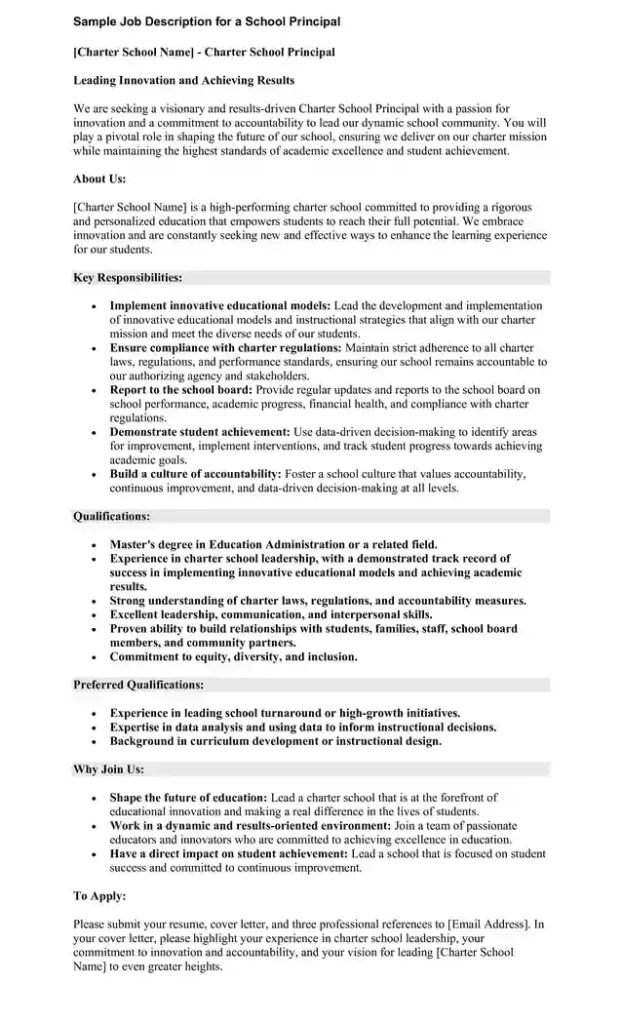
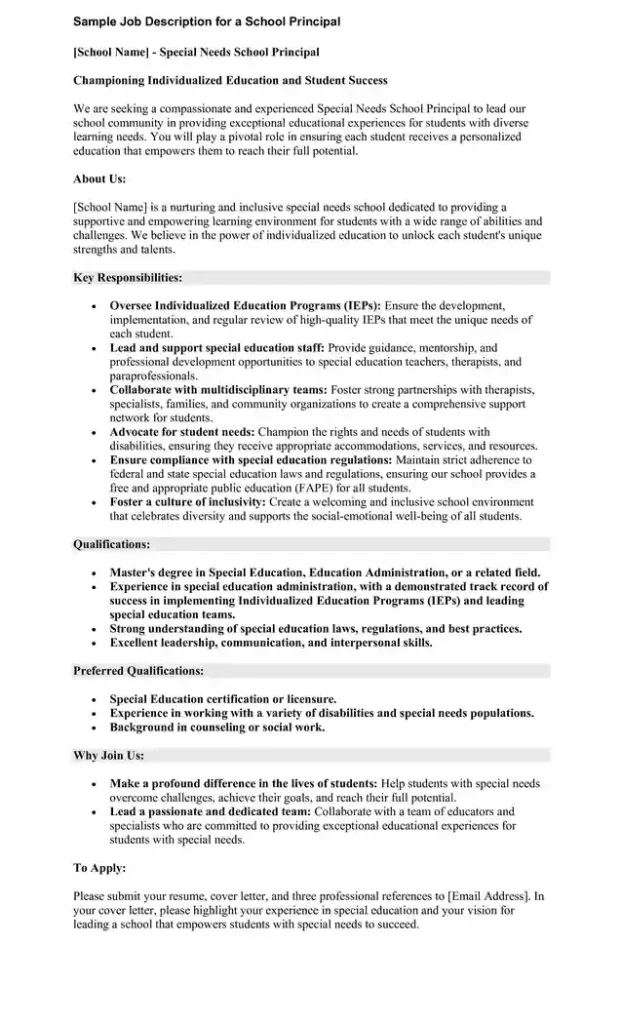
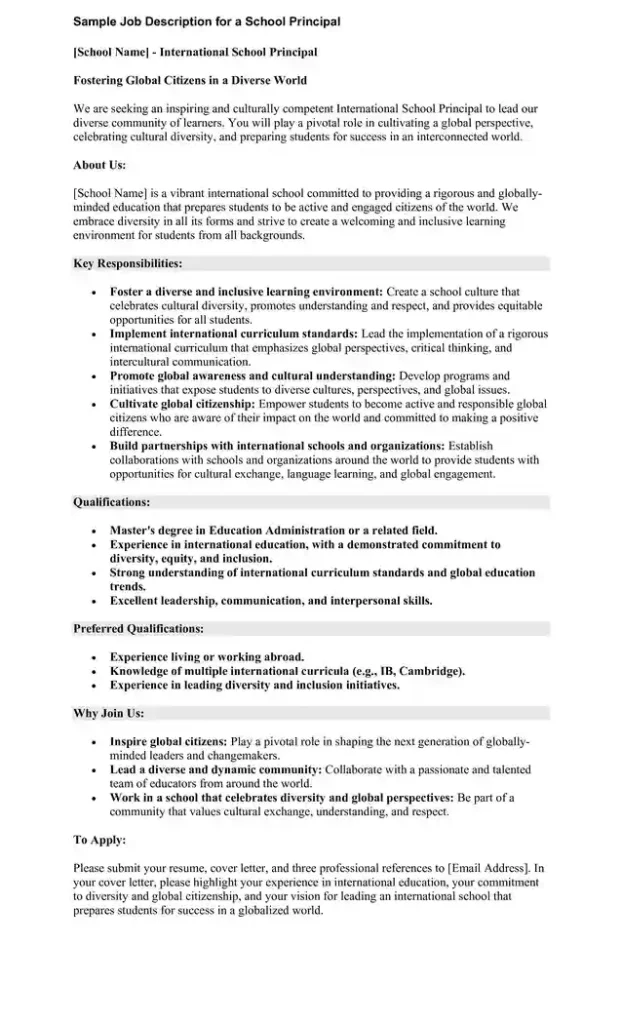
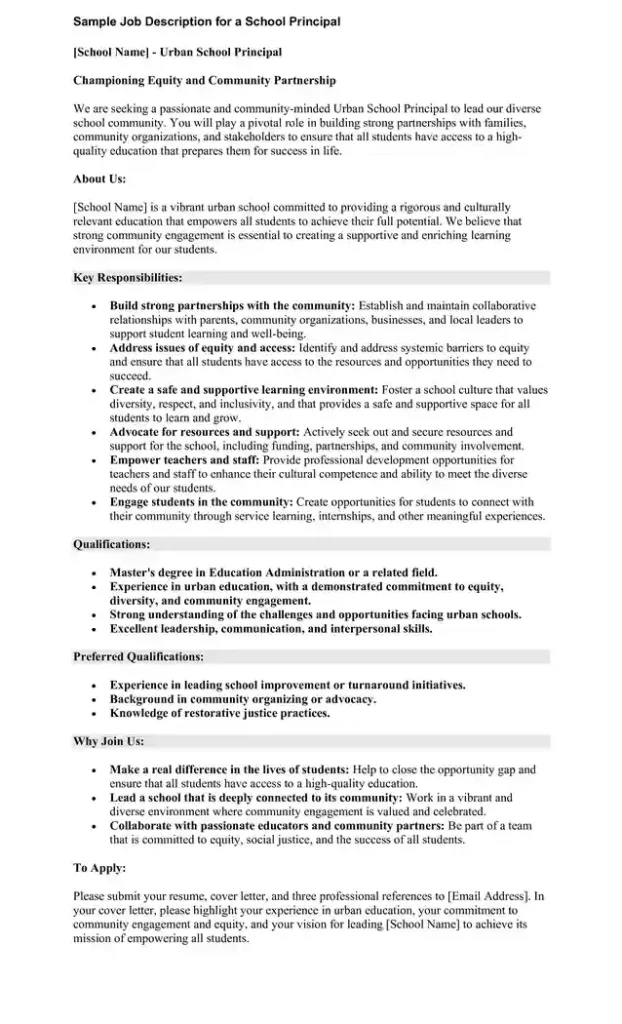
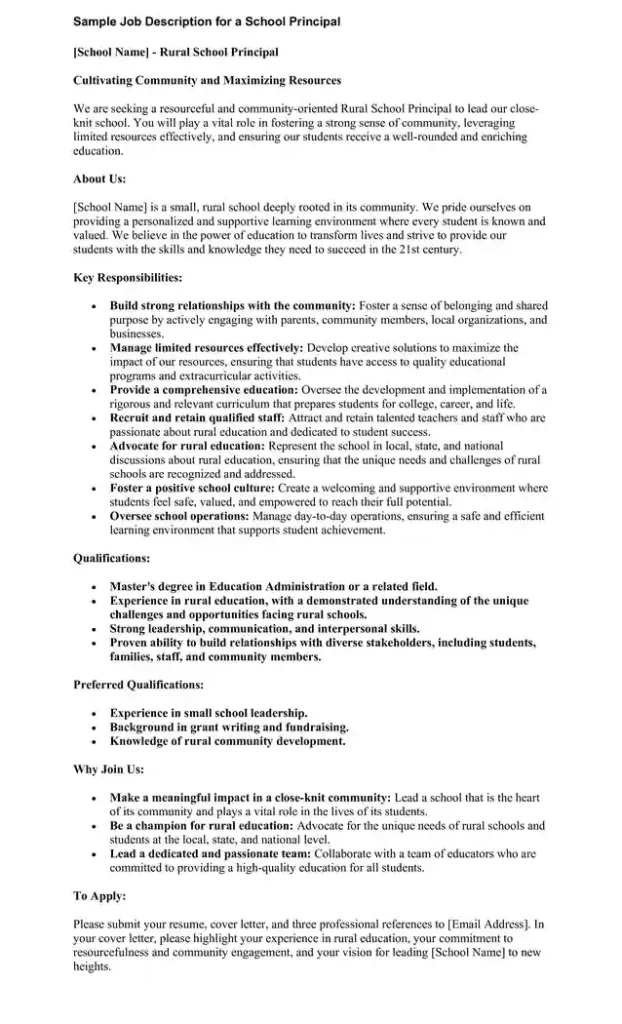
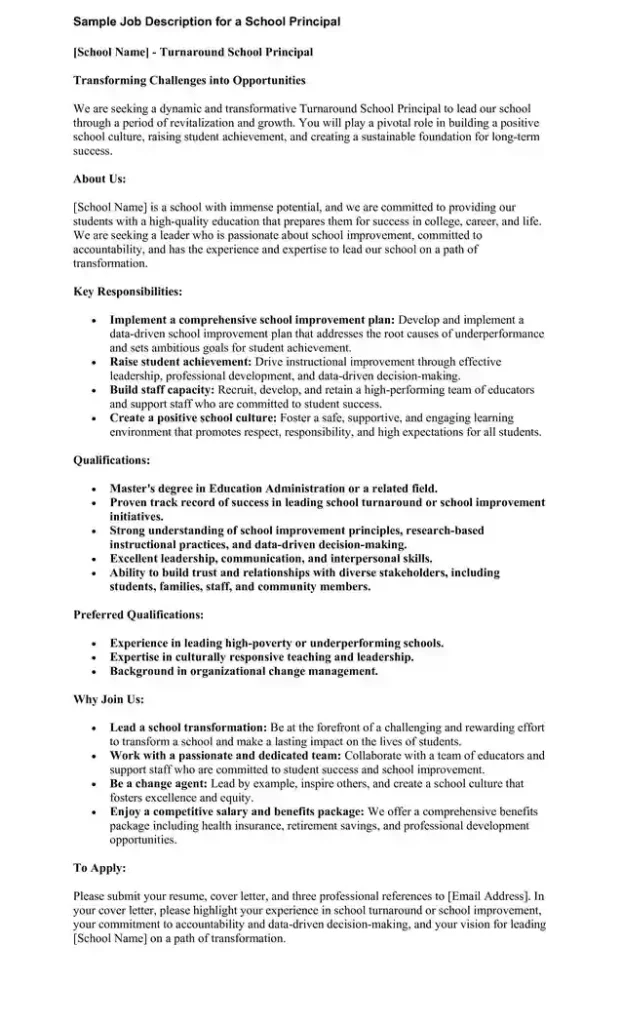
Average School Principal Salary
Salary Range
The salary of a school principal can vary widely based on location, experience, and the type of school. Here are some estimates:
- Salary.com: $90k–$140k per year for school principals in Texas
- ZipRecruiter: $69k–$120k per year for high school principals in Georgia
- Indeed: $85k–$210k per year for principals in California
Average Salary for School Principals
On average, school principals earn a good salary. The specific amount can depend on several factors:
- Location: Salaries can vary based on the state or city where the school is located. For example, principals in California may earn more than those in Georgia.
- Experience: More experienced principals tend to earn higher salaries. Those with many years of experience and advanced degrees typically earn more.
References
- Indeed: Principal Salaries in California
- ZipRecruiter: High School Principal Salaries in Georgia
- Salary.com: School Principal Salaries in Texas
In conclusion, the job description for a school principal includes many tasks. They lead the school, support teachers, and handle student discipline. Knowing their duties and skills shows principals’ importance in creating a successful and safe school environment.

Alexander is a skilled HR expert who writes clear and compelling job descriptions. He has spent over 15 years in the HR field, helping companies find and keep the best employees. With a degree in Human Resources Management from the University of Chicago, he has the knowledge to back up his experience.






